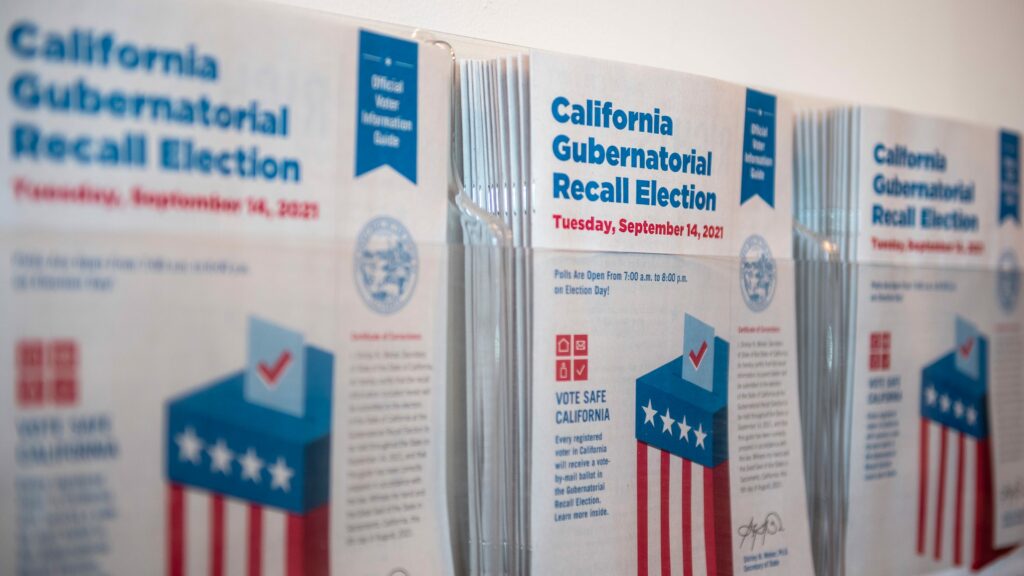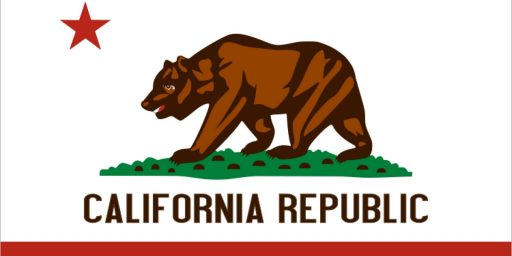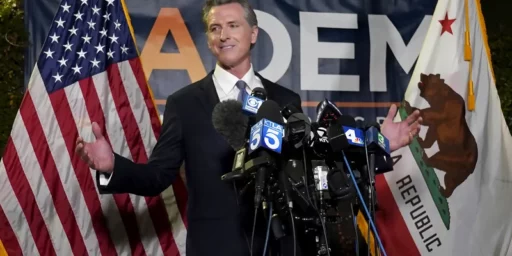Is California Recall Unconstitutional?
A novel but flawed legal argument.

Last week, two Berkley law professors, Erwin Chemerinsky and Aaron S. Edlin, published an op-ed in the NYT titled “There Is a Problem With California’s Recall. It’s Unconstitutional.” The crux:
The most basic principles of democracy are that the candidate who gets the most votes is elected and that every voter gets an equal say in an election’s outcome. The California system for voting in a recall election violates these principles and should be declared unconstitutional.
Unless that happens, on Sept. 14, voters will be asked to cast a ballot on two questions: Should Gov. Gavin Newsom be recalled and removed from office? If so, which of the candidates on the ballot should replace him?
The first question is decided by a majority vote. If a majority favors recalling Mr. Newsom, he is removed from office. But the latter question is decided by a plurality, and whichever candidate gets the most votes, even if it is much less than a majority, becomes the next governor. Critically, Mr. Newsom is not on the ballot for the second question.
By conducting the recall election in this way, Mr. Newsom can receive far more votes than any other candidate but still be removed from office. Many focus on how unfair this structure is to the governor, but consider instead how unfair it is to the voters who support him.
[…]
This is not just nonsensical and undemocratic. It is unconstitutional. It violates a core constitutional principle that has been followed for over 60 years: Every voter should have an equal ability to influence the outcome of the election.
The Supreme Court articulated this principle in two 1964 cases, Wesberry v. Sanders and Reynolds v. Sims.
They add,
This issue was not raised in 2003 before the last recall, when Gray Davis was removed from office after receiving support from 44.6 percent of the voters. But his successor, Arnold Schwarzenegger, was elected to replace him with 48.5 percent of the vote. So Mr. Schwarzenegger was properly elected.
Granting that I’m not a lawyer, but this argument strikes me as absurd. The question in the 1964 cases was the size of Congressional districts and the Court, extending the rationale in 1962’s Baker v. Carr, ruled that they must be roughly equal in the number of people represented. It is more than a wee stretch to extend this rationale to the California recall.
Essentially, California voters are being asked two questions. First, Should Gavin Newsome be recalled as governor? Each voter gets an equal say in this question. If a majority of voters vote in the affirmative, then Newsome is recalled and the second question—Who should replace Newsome as governor?—becomes operative. It would be absurd, indeed, to argue that Newsome should replace himself because he got more votes by losing a binary contest to retain his officer than the winner in a multi-candidate race did in a separate contest.
The crux of the matter is that Chemerinsky and Edlin, who are surely very bright fellows, are treating this as one contest when it is two. If, very inefficiently, California held the recall election on September 14 and, if Newsome were recalled, held a contest to see who should replace him on September 21, they surely wouldn’t argue that it was an Equal Protection violation if the winner got fewer votes than Newsome had gotten the previous week in a losing contest. It would be as absurd as claiming that George H.W. Bush should have been declared the winner of the 1992 election because Bill Clinton only got 44,909,889 million votes (and 370 Electoral votes) whereas Bush got 48,886,597 votes (and 426 Electoral votes) in 1988.
There’s an argument to be made that it’s absurd to elect a replacement governor on the basis of a plurality vote in a multi-candidate election. Indeed, I would much prefer a system that forced a majority winner, whether via a run-off between the top two vote-getters or some form of instant runoff voting. But the Constitution rather clearly imposes no requirement to do so.
I bring up a week-old op-ed because, POLITICO reports, someone is using its argument as the basis for a federal lawsuit.
Two California voters are challenging the legality of the state’s recall system less than a month before the Sept. 14 election, echoing concerns from constitutional scholars as Gov. Gavin Newsom fights for his political life.
A complaint filed in U.S. District Court for the Central District of California argues that the state’s recall provision violates the equal protection clause of the U.S. Constitution by allowing sitting governors to be replaced by candidates who have received fewer votes. The plaintiffs, Rex Julian Beaber and A.W. Clark, want a court order either prohibiting the recall election or adding Newsom’s name to the replacement candidate list. Elections officials have already sent millions of ballots ahead of a state deadline today.
[…]
Beaber, a Los Angeles attorney and clinical psychologist, would not say in an interview if he’s a Democrat.
“I would prefer not to say, simply because I think it’s irrelevant,” he said Monday. “To me it would be unfortunate if party politics was the driving force behind the consideration of this lawsuit. This lawsuit seeks on its face to declare a current California remedy as unconstitutional and it would apply regardless of whether it was a Democrat or a Republican already in office.”
Elected Democrats have not publicly embraced Chemerinsky’s reasoning or backed such a legal challenge. But Attorney General Rob Bonta said Monday that he was monitoring both the lawsuit and the underlying legal debate.
“We’re aware of that argument and some of the other concerns and we’ll be making sure we stay abreast of this issue and monitoring it,” Bonta said, adding of the lawsuit, “We’ll be coordinating with the secretary of state’s office to determine next steps.
I can’t imagine this gets far. It’s really not that interesting an argument.





The way you state the issue, I.e. two unrelated questions, does lead to your conclusion. But if you restate it as this, “in a recall election, the governorship is decided by plurality, except for the incumbent who can only win by absolute majority”, it changes the picture. It might be constitutional in the end, especially given the current Supreme Court, but that is far from obvious.
If we’re honest about it, the second question should never even be on the ballot. The CA code already provides for succession in the event the governor’s office becomes vacant for any reason. If Newsome is successfully recalled, Kounalakis should become governor in his stead.
No edit button. “code” should read”constitution”. My devices have a sense of humor today.
The field of political science has long been aware of the inherent contradictions that exist within a democratic system and extremists often use these flaws to advance their agenda. The problem is that a binary system (yes/no) can allow for different outcomes depending on how the process is designed. When a question posed to the populace cannot garner a majority, the outcome will depend on the framing of the question. I don’t think the California recall law is unconstitutional per se but it is poorly drawn.
@HarvardLaw92:
When I see the word code in that context, I think of “criminal code.”
Is this the same recall that one of the Kardashian girls was running in, until she had to go be in a reality show?
@CSK:
Mmhmm. Evidently I type “code” a lot on my iPad and I didn’t catch the autocorrect. I love it when technology “helps” me 🙂
I don’t understand why Gavin Newsom didn’t file the paperwork to run to replace himself. It would have been no less absurd than anything else about this.
I just received my info about the recall and I look on the sample ballot page and see something simple, Recall Gavin Newsome: yes/no, I then turn over the page and holy cow a wall of names assaults my eyes. For all that I know the names of someone’s cats are on the ballot and the next Governor of CA might be one of Kevin Drum’s cats!
@HarvardLaw92: We’re Microsoft, we know more than ewe do.
Just to be clear I’m not expressing an opinion on constitutionality either at the CA or Federal level, as my lack of legal knowledge pretty much guarantees my opinion would be worthless. HarvardLaw92 might have something worth listening to, but I don’t.
My only point was that James framed the question in such a way as to make the constitutionality question obvious but frame the question differently and it is not obvious.
@inhumans99: Which is to say the next governor of CA could have a mandate in single digits. And Hilbert or Hopper would probably be better than most of the humans on the list.
(Cartoon in New Yorker: A dog standing on it’s hind legs with a thought bubble, “I can stand upright and walk!” A parrot with a word bubble, “I can speak English, and understand it perfectly!” A cat curled up on the floor with a thought bubble, “I can do both. But they’ll never find out.”
@Gustopher:
He isn’t permitted to do so. The clause explicitly debars an officer subject to recall from running to replace him/her self.
Realistically, the CA constitution is in conflict with itself here. Assuming Newsome actually is recalled, this would be an excellent test case to do away with these ridiculous recall-attached elections. As soon as he’s determined to have been recalled, Kounalakis should bring suit alleging a violation of Article V Section 10, specifically that she has unconstitutionally been deprived of her rightful office.
I have my sample ballot now, and I’ve looked through it. The list of candidates is such a clown show. I’m not super enthusiastic about Newsom, but I am super enthusiastic about keeping any of these guys out of the governor’s mansion.
The election is being conducted completely by mail. I expect other Democrats will feel much the same as me and mail in a NO.
It is most certainly unfair. I think it was created to take a shot at Leland Stanford or something like that. I have no idea if that translates to “unconstitutional”.
@Jay L Gischer:
I’m fairly certain that the recall process was added during the Progressive era as a reaction to the corrupt railroad controlled government that ran the state until then.
Personally, I think it’s constitutional but stupid.
@HarvardLaw92: @HarvardLaw92: Busy day at the office so just getting to this. I claim no expertise in the California constitution but the recall provision itself is part of Article II, no? So, surely, it doesn’t violate Article II?
But, yes, I agree that it would make more sense to simply recall the governor and have the lieutenant governor serve out the term. But ♂️
@inhumans99: Indeed! I’m not a fan of instant runoff. The easier choice is to simply limit the ballot to credible–one’s with more than say 10% support (IOW, none of them)–parties and candidates if you want a majority winner on one ballot. In the case of a 46 candidate ballot, I’d be fascinated to see what a clusterphlip that would become.
@James Joyner:
There is an inherent conflict between Article II Section 15 and Article V Section 10. Perfect opportunity to get the question before the CA Supreme Court IMLO. If it came down to it, I think they’d rule in favor of the delineated line of succession and do away with the recall-attached election.
@HarvardLaw92: That’s a more interesting argument than the one advanced by the petitioners! I don’t know how courts resolve contradictory provisions enacted simultaneously.
@James Joyner:
I (living in a country without “recall”) think this will not make much sense – if the voters vote to recall the governor, supposedly they are against his policies; but if he is replaced by the lieutenant governor (probably a close collaborator), the policies will remain similar.
@Miguel Madeira:
The norm in the US is to have a legally delineated line of succession for elected offices like governorships. It avoid confusion and ensures continuity of government free from specious challenges or fractious infighting / coup attempts when an office is prematurely vacated.